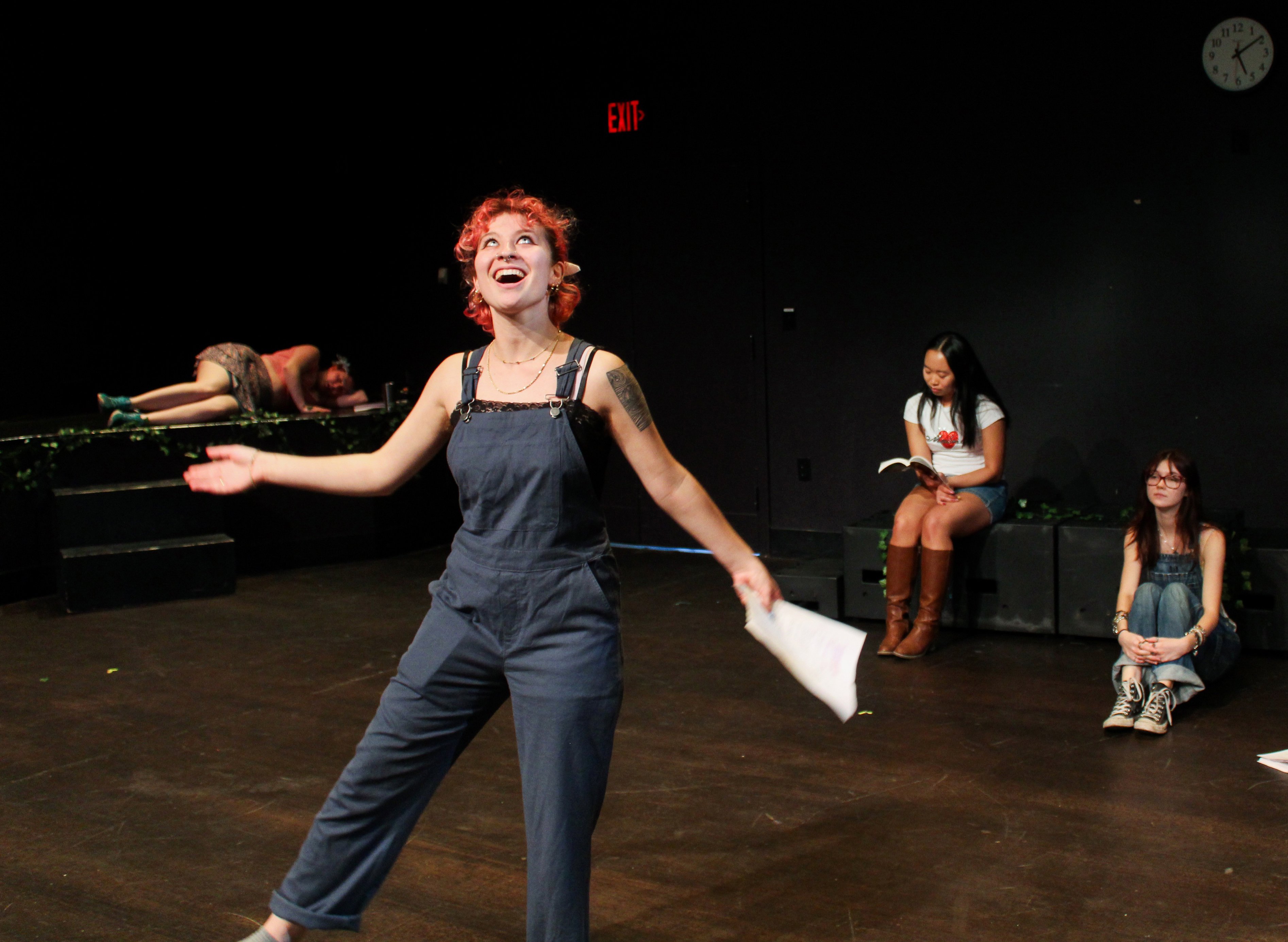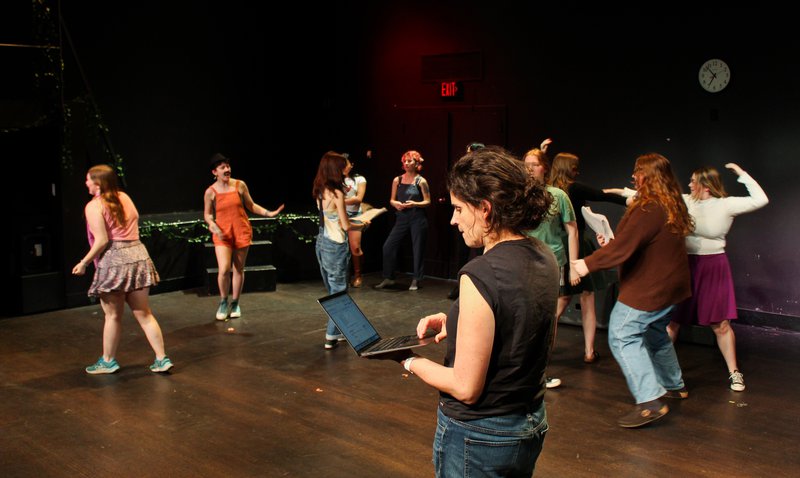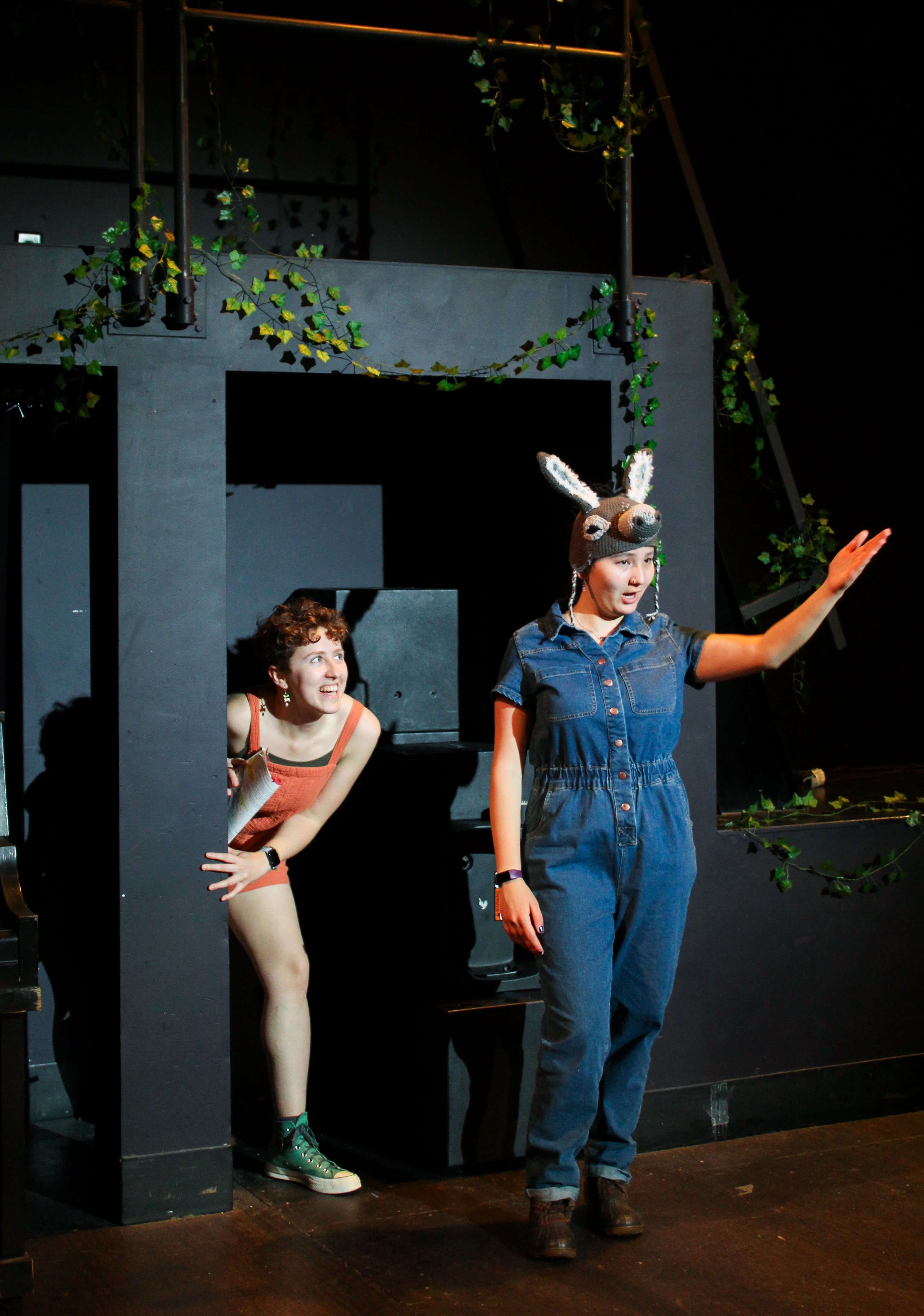Taking the Stage for an Immersive Lesson in Shakespeare
In Professor Stephanie Shirilan’s class, “Doing Shakespeare,” students gained important soft skills while learning about the playwright and poet through performance.

When enrolling in an English class about Shakespeare, you might imagine that the course will involve reading, writing and discussing the famous playwright and his plays. In professor of English Stephanie Shirilan’s class, “Eng 411: Doing Shakespeare,” which was offered in Spring 2024, this was just the beginning. Shirilan wanted students to explore for themselves how theatrical practice and production generate different modes of inquiry than text study alone. By engaging in hands-on and active learning, the experience aimed to enhance students' problem-solving abilities, boost their confidence and encourage their creativity—soft skills which are crucial for success after graduation.
“The idea of the course, simply, is that students learn Shakespeare by ‘doing Shakespeare,’” says Shirilan. “I issued an invitation to make of this course what they willed, and what they willed was a full production of a play chosen, as we strove to do with every decision, collectively.”
Learning by Doing
Shirilan’s inspiration for this course draws from the educational technique of “learning by doing,” a teaching methodology where students retain information through active learning and hands-on experience. In “Doing Shakespeare,” students were presented with a full range of options for the scale and scope of production to pursue.
“They chose to mount a full show, or aim towards it, understanding that we would be working collaboratively and distributing the labors across as many hands as were able and willing,” says Shirilan. “Everyone was involved in multiple areas of production. Everyone acted, most students took responsibility for a production element, including props, costume and sound design.”
Together the students conceived of, organized and performed a full theatrical production of Shakespeare’s “A Midsummer Night’s Dream.” The crew, many of whom had little to no prior theater experience, included Tate Abrahmason, Maurissa DEmello, Sinead Feeney O’Connor, Anderson Fuentes, Valerie Goldstein, Eva Greene, Victoria Lafarge, Jenny Lee, Ailis McVearry, Blair Seaman, Alexandra Steward and Cricket Withall.
Before moving into production, students spent the first half of the semester largely devoted to text study, table work, vision work and research. During the second half of the semester, the team went into production mode, blocking, rehearsing and producing the play. The semester concluded with a full theatrical performance at Syracuse Stage.

Professor Stephanie Shirilan reviewing the script during a rehearsal.
Wearing Many Hats
“Doing Shakespeare” offered students a unique opportunity to have a hand in every aspect of the performance, from design to direction.
Valerie Goldstein ’24, who majored in policy studies in the College of Arts and Sciences | Maxwell School and minored in applied data analytics in the iSchool, went into the experience thinking it would mostly involve acting, but was delighted to discover the wide range of skills she would ultimately utilize.

“I played Bottom and Oberon and was an assistant director, producer, projections designer and did other odd jobs like creating the daily rehearsal schedule, carpool system and tech to-do lists,” says Goldstein. “There were so many lessons in problem solving and actually following through and creating something that I never would have learned in a traditional classroom.”
After graduation, Goldstein accepted a position with Teach for America. As she embarks on a career in teaching and education policy, she says taking part in a course that involves performance-based learning - where students apply their knowledge and skills to execute a task – will inform her own instructional techniques.
“I think there are better ways to engage students than having them study something abstractly all the time,” says Goldstein. “This class gave me an opportunity to explore a new pedagogy that I may be able to implement in my own profession.”
Blair Seaman ’24, who majored in broadcast and digital journalism in the Newhouse School, was an assistant director and played Titania and Hippolyta in the production. Rounding out her time at Syracuse with an acting role in a Shakespeare play marked a full circle moment for her as she had previously participated in a children’s Shakespeare troupe in her hometown.
“The theater had a huge impact on me deciding to come to Syracuse to study journalism, as I wanted to fuse my love for storytelling with a passion for helping others,” says Seaman. “As much as I loved my degree, I had truly missed performing, and so, I eagerly jumped at the chance to take a class called ‘Doing Shakespeare.’”
She notes that the class was the perfect way to end her four years at Syracuse, and on a more personal level, provided an opportunity to memorialize her mother, who passed away when Seaman was a sophomore at Syracuse.
“[My mother] always sat front row in every production I had previously been a part of, and in a way, it felt like a gift to her to perform in one last show,” Seaman says. “As I said goodbye to my college experience, I was able to return to a passion of mine that was built up through her love.”
Honoring a Classmate
While the performance marked a time to celebrate the culmination of the team’s hard work, it also presented a moment to honor a classmate who gave so much to the production but was unable to participate in the finale due to health reasons. Ailis McVearry ’24 assumed various duties during the semester, from working as an assistant director, to head of costuming, to starring as Oberon and Theseus.
In support of their classmate, students collected contributions and donated proceeds from the final performance to defray transportation and other costs related to her care. Donations can still be made to support McVearry on GoFundMe.
“Our final production honored her and the beautiful work she poured into this class both on and off the stage,” says Shirilan. “We hope that the money we raised can be used to provide comfort to her during this difficult time, assisting with medical bills and other essentials.”
A Performance for the Ages
According to Shirilan, the culminating performance marked a milestone for the English department and the College of Arts and Sciences (A&S), as it was likely the first full theatrical performance put on by an A&S class at Syracuse Stage. A testament to their hard work, shows were nearly sold out before opening night.
“The final performance was truly a triumph,” recalls Shirilan. “I was consistently amazed by the insights and discoveries made through this process, a success that reflects the astonishing commitment, capability and courage of this team.”
With the high level of interest shown by students for this class, Shirilan is exploring possibilities for expanding the course as a 6-credit offering to facilitate running it as another full production experience. For now, she is scheduled to teach it in Spring '25 as a 3-credit course, for which students will collectively decide the scope and scale of production.
Watch the class’s performance of “A Midsummer Night’s Dream.”
